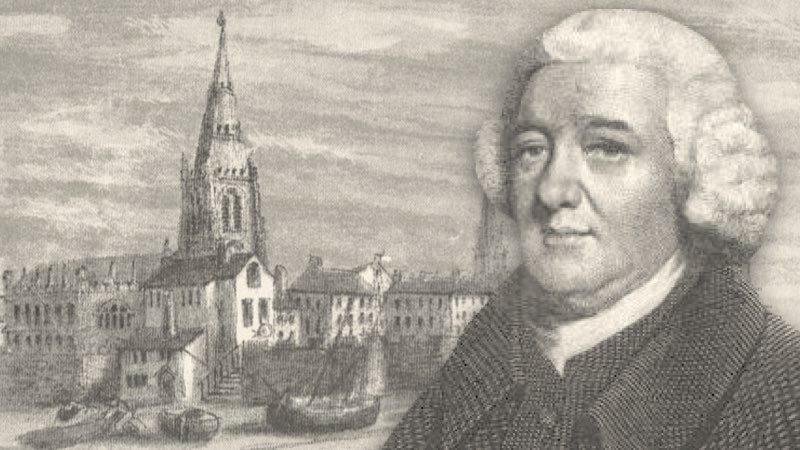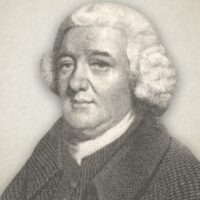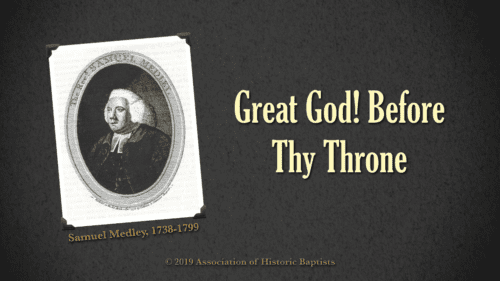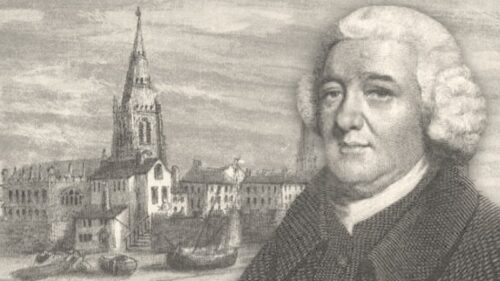
The Life And Ministry Of Samuel Medley
John Gadsby:
“Samuel Medley was born at Cheshunt, in Hertfordshire, on the 23rd of June, 1738, and was educated under his grandfather, Mr. Tonge, at Enfield. About the age of 14 he was apprenticed to an oilman in London; but this calling does not appear to have suited his active turn of mind, and he resolved to quit it as soon as possible. Accordingly, when the war broke out in 1755, amongst other offers held out as an inducement for young men to enter into the navy, there being one that apprentices might finish their time in the king’s service, he resolved to leave his master, and turn sailor; so he entered as midshipman on board the Buckingham, 74-gun ship. His two brothers were already at sea. His father and grandfather did all in their power to divert him from his purpose, but without avail. At sea he strove to excel, and soon gained the esteem of the captain and officers, the former of whom, it seems, had also been educated under Mr. Tonge. From the Buckingham, Mr. Medley, with the captain and officers, was removed to the Intrepid, another 74-gun ship, on board of which he was made master’s mate; and soon after sailed with a squadron under the command of Admiral Boscawen. Their destination was the Mediterranean, where they were stationed three years, off Gibraltar, Cadiz, &c. Here he had an opportunity of seeing much of the world and mankind; nor did he fail making such observations as were afterwards profitable to him through life, though at this time, it appears, he was in the zenith of his profaneness. How often, looking back to this period with contrition and gratitude, has he mentioned the awful lengths he was permitted to run, and how much he was under the power and dominion of his corruptions, being at the greatest possible distance from God, and utterly averse to every serious reflection that might occasionally intrude upon his mind! Possessing a considerable share of classical learning, great wit, a fine constitution, and an unbounded flow of spirits, he was at once the life of the giddy circle in which he daily associated, and was universally prized as a companion in mirth. This lively and volatile turn of mind, he many times said, was at this time his greatest snare, and led him into more evil than any other temptation. Thus flattered and caressed by his light and profligate companions, he gave full scope to his reigning propensities; acknowledging that he had neither the fear of God nor man before his eyes. But, though lost to every serious impression, he was not totally without some flashes of conviction, which, in spite of all his mirth and jollity, would sometimes cast a momentary damp upon his pleasure. As an instance of this, he one day, in the height of his profaneness, casting his eyes on a favorite dog belonging to the captain, that lay by his side, suddenly wished he was that dog, that he might have no soul to be saved. Though he had no religion himself, he evinced the most thorough contempt for the gross superstitions he beheld while in Spain. During his service he was engaged in several actions, but the most important, and the last, was the battle fought off Cape Lagos, on the 18th Aug., 1759, under Admiral Boscawen. This was a hard-fought and obstinate engagement, and the slaughter of the enemy, owing to their custom at that time of crowding their ships with men, was particularly affecting. On board of many of the French ships they stove in their barrels of flour, to absorb the blood that flowed on their decks, in order to prevent the sailors from slipping. The station which Mr. Medley occupied during this action was OD the poop, where he had a table and chair to take the minutes. From this elevated situation he had not only an opportunity of observing every circumstance that happened on board the Intrepid, but could perceive the enemy drop as they were killed or wounded, the action was so close. Thus surrounded by death, and in the most imminent danger, he has often said he was so callous that he had neither fear nor care. The first thing that startled him was observing a shot shiver the mizenmast, while the captain, first lieutenant, and master, were conversing together, the former leaning with his arm against the mast. None of them, however, were materially hurt. A scene that affected him still more was that of a wounded marine, carried off the deck by his comrade, to go to the surgeon; but, while at the top of the ladder, a shot taking the man in the bowels who bore his wounded companion on his shoulders, they both instantly fell down into the hold together. Not long after this, the master, turning himself round, cried out, “Mr. Medley, you are wounded.” On his looking down and seeing a quantity of blood, and the muscles of his leg torn, his spirits felt a damp for the first time. Being a wound of such a nature as required immediate assistance, owing to the loss of blood, great part of the calf of the leg being shot away, he rose from his seat and walked down to the surgeon. The action continued some time after, but ended with the utmost success on the side of the English. Poor Medley was now entirely incapacitated from attending to his duties, and was ordered to keep his bed. His wound grew daily worse, until at length the surgeon informed him there was every appearance of gangrene, and that he feared the only means of saving his life was amputation, which must be finally determined by the state of the wound next morning. This was sad news to him, and he at once began to think seriously. He called to his mind the education and advice he had had, and the prayers that had been offered up on his behalf by his father and grandfather. Considering his case as desperate, “it occurred to his mind,” (I quote from his Life, as written by his son,) “that prayer to God must be his last resource;” and accordingly he prayed “very fervently for the restoration of his limb and the preservation of his life,” for at that time he seemed not to be in much trouble about his soul. He also recollected having seen a Bible, which some one, perhaps his father, had put in his chest and, though he had never opened it before, he ordered his servant to fetch it, and, like many others when sick, began to read it with avidity. The next morning, on the wound being examined, the surgeon, lifting up his hands, exclaimed that the change was little less than a miracle. Pleased at this unexpected event, Medley did not fail to set it down as an answer to his prayers, and began to think that there was something real in religion after all. All this wore off, however, as his wound healed. The fleet being ordered home, Medley was permitted to leave the service until he was perfectly restored, and to return or not as he pleased; but, flushed with the thoughts of so signal a victory, he made up his mind he would not leave the service until he was made an admiral. He was now carried to the house of his grandfather, Mr. Tonge, who had then left Enfield and was residing in London, Here he was compelled, much against his will, being confined to his room for many months, to hear many a faithful admonition and many a solemn warning; and this became so irksome to him at last that he grew impatiently anxious to be released. His wound being nearly healed, he began to lay his plans for returning to the service; but God had laid his plans, and poor Medley’s were soon brought to nought. Being anxious to know, one Lord’s Day evening, if his grandfather were going out to worship, he inquired of the servant, who told him that Mr. Tonge was going to read a sermon to him. “Read a sermon to me!” exclaimed Medley; “he had better be anywhere else.” However, he had sufficient prudence to maintain a respectable deportment in the presence of the old gentleman. The sermon read was one of Dr. Watts’s, from Isa. 42:6,7. Medley at first listened with his usual indifference, but when the sermon touched upon those parts about opening the blind eyes, and ears, he listened with eagerness, for every sentence described his own case, and every word sank deep into his heart. Convinced of his awful state as a sinner before God, and the imminent danger he was in as such, with a heart broken under a sense of his guilt and impenitence, and the astonishing forbearance of God towards him, he fell down before the Lord, as soon as he was alone, and spread before him his mournful, dangerous case. He was now soon able to go out, and often went to hear Whitefield, Gifford, &c. It does not appear that he was kept long in bondage, but “soon received the comforts of the gospel, by a believing view of the fulness and sufficiency of the atonement of the Lord Jesus.” His father just survived long enough to see his earnest petitions answered on behalf of his then only child, for both Medley’s brothers had been lost at sea. Medley now gave up all thoughts of the navy, though he had been promised a lieutenant’s commission. In Dec, 1760, he joined Dr. Gifford’s church, in Eagle Street, London, and about the same time opened a school near the Seven Dials. In April, 1762, he married, and removed to King Street, Soho, where his school rapidly increased. In 1766, Dr. Gifford, having formed ideas of Medley’s gifts for the ministry, questioned him on the subject, when he confessed it had been for some time on his mind, though he was greatly surprised at the interrogation, never having said a word upon the subject to any person whatever. He was soon afterwards heard by the church, and by them called to the work. His first labors were in the neighborhood of London; but in June, 1767, he accepted a call from the Baptist church at Watford, Herts, where he remained until 1772, when he removed to Liverpool. Here his congregation increased so rapidly, that, in the following year, the chapel had to be enlarged, and in 1789 the new chapel in Byrom Street was erected. For a number of years he went annually to London, and preached in Whitefield’s places, (the Tabernacle and Tottenham Court Road Chapel,) and had the pleasure of invariably finding that his labors were not only acceptable, but owned and blessed to many. The general scope of his ministry was “to humble the pride of man, exalt the grace of God in his salvation, and promote real holiness in heart and life.” For some years Medley’s health began to decline; but it was not until Oct., 1798, that he was attacked with the first symptoms of the disease which terminated his death. Being engaged as usual to pay his annual visit to London, he thought the journey might, as before, be beneficial to his health but, on his arrival there, jaundice began to make its appearance, so that he was obliged for some time to give up preaching, and it was doubtful whether he would be able to return to Liverpool. This, however, he was sufficiently recovered to do, in January, 1799, and on the following Lord’s Day preached twice. He was now again laid by until Easter Sunday, when he preached his last sermon, his text being Deut. 8:2. His complaint increased until it terminated in a confirmed dropsy, and all hope of recovery was given up…Frequently his struggles were very violent, and he would then say, “Take courage, my soul! Why art thou cast down?” Once, when greatly agitated, he said, “It is hard work!” and he again cried out, “One grain of creature comfort, Lord, one grain!” Then lying more composed, he said, “Well this is a mercy!” His children now asked, “Do you know us, dear father? With great earnestness he replied, “Know you! Yes, sure I do.” He then took a most affectionate leave of them all, and of several friends who surrounded his dying bed. Being asked, “What shall we say for you to the absent part of the family?” mentioning their names, he replied, “Say, my dear love to them, and tell them I am going home in peace to my dear Jesus.” About 6 o’clock in the evening, he said, “Dying is sweet work! sweet work! my heavenly Father! I am looking up to my dear Jesus, my God, my portion, my all in all,” and then with a dying voice continued, “Glory, glory! Home, home!” And in about half an hour afterwards he died, without a struggle or a groan, July 17th, 1799.”
Samuel Medley (1738-1799) was a Particular Baptist preacher and hymn writer. He was appointed the pastor of a church on Byrom Street, Liverpool, where he served for twenty-seven years.






